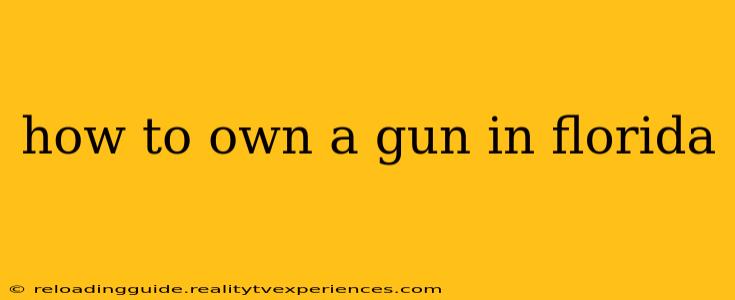Florida's gun laws can be complex, so understanding the process of legally owning a firearm is crucial. This guide will walk you through the necessary steps, highlighting key requirements and considerations. This information is for general guidance only and should not be considered legal advice. Always consult with a legal professional for personalized advice regarding Florida gun laws.
Who Can Own a Gun in Florida?
Florida law dictates specific eligibility requirements for firearm ownership. Generally, you must be:
- 21 years of age or older: This applies to most firearms. There are some exceptions for certain types of firearms and individuals with specific licenses.
- A U.S. citizen or lawful permanent resident: Proof of citizenship or residency will be required.
- Mentally competent: Individuals with certain mental health adjudications may be prohibited from owning firearms.
- Not subject to a domestic violence injunction: Having a current domestic violence injunction against you can prevent firearm ownership.
- Not a convicted felon: A felony conviction usually prohibits firearm possession, though some exceptions might apply depending on the nature of the crime and subsequent rehabilitation.
The Process of Purchasing a Firearm in Florida
The process for acquiring a firearm in Florida generally involves these steps:
1. Choosing a Firearm and Retailer
Select a firearm that suits your needs and find a licensed firearms dealer in Florida. These dealers are required to conduct background checks.
2. Background Check
This is a critical step. The dealer will initiate a background check through the National Instant Criminal Background Check System (NICS). You'll need to provide identification and complete the necessary paperwork. The waiting period varies, but you will not receive the firearm until the background check is cleared.
3. Firearm Registration (Not Required in Florida)
Florida does not require firearm registration. This means you are not required to register your firearm with the state.
4. Understanding Florida's Gun Laws
This is perhaps the most crucial step. Familiarize yourself with all relevant Florida gun laws. These cover aspects such as:
- Carrying a concealed weapon: Florida permits concealed carry, but obtaining a concealed weapons license (CWL) requires specific training and background checks.
- Open carry: Florida allows open carry of firearms in most locations, but certain restrictions apply.
- Storage requirements: Safe gun storage practices are encouraged to prevent accidents and unauthorized access.
- Transportation regulations: Specific rules govern the transportation of firearms in vehicles.
- Places where firearms are prohibited: Certain locations, such as schools, government buildings, and bars, prohibit firearms.
Obtaining a Concealed Weapon License (CWL) in Florida
If you wish to carry a concealed weapon, you'll need to obtain a CWL. This involves:
- Completing a firearms training course: This course covers safe firearm handling, Florida gun laws, and other relevant topics.
- Submitting an application: This includes providing fingerprints, passing a background check, and providing proof of residency.
- Paying applicable fees: Fees for the application and training course will apply.
Resources and Further Information
Staying informed about Florida's evolving gun laws is essential. Consult the following resources for the most up-to-date information:
- Florida Department of Agriculture and Consumer Services (FDACS): The FDACS oversees the licensing of firearms dealers and the issuance of CWLs.
- Florida Statutes: The official collection of Florida's laws.
Remember, responsible gun ownership includes understanding and adhering to all applicable laws and safety regulations. This guide provides general information; it's crucial to seek professional legal advice to ensure compliance with all relevant Florida statutes.

